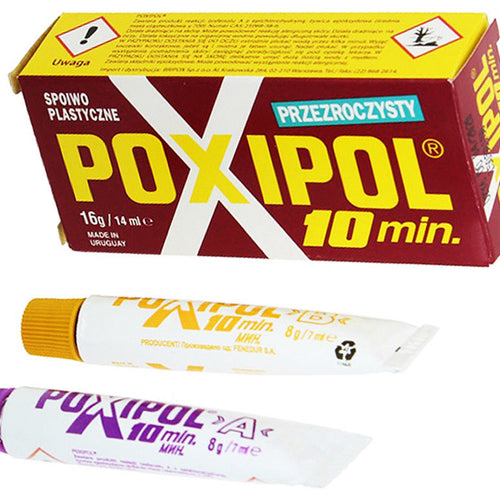POXIPOL Clear 2 components Putty 10 Min Epoxy Resin Adhesive

POXIPOL Clear 2 components Putty 10 Min Epoxy Resin Adhesive
POXIPOL
£5.51 Ex VAT
POXIPOL® is the most resistant and durable adhesive.
It is a two component adhesive, easy to prepare and use.
Glue a wide variety of materials: metal, cement, earthenware, wood, marble, plastics (except polyethylene, polypropylene and Teflon), glass, concrete, fiber cement, ceramics, granite, porcelain.
Due to its great resistance and durability it is ideal for making home, workshop, car, work, hobbies and crafts.
Excellent adhesive with characteristics similar to metal welding.
It is applied with the ease of a paste and hardens like metal.
It does not drain even on vertical surfaces.
It does not contract, expand or deform.
Does not contain solvents.
Once cured, it can be drilled, filed and sawed with common tools. It can also be painted.
Once cured, it resists water, oils and temperatures up to 120 ° C depending on the application.
It comes in metallic and transparent colours.
Applications
Some of the most common uses of POXIPOL® are listed below:
In the kitchen
Repair of handles of large utensils such as ladles.
Fixing of fittings in cupboards, kitchen appliances, doors.
Placement of hinges in kitchen furniture.
Bonding of stainless steel basins to marble countertops (we recommend POXIPOL® Slow Fragment).
Bonding and restoration of missing marble countertops (we recommend POXIPOL® Transparent 10 min).
In the bedroom
Arming, repairing, fixing and joining pieces of wooden furniture or pieces of metal. Especially suitable for restoring and welding areas subjected to weight and important efforts such as slats and stringers on beds, table legs, armchairs, chairs.
Repair of wooden and metal doors and windows.
Fixing hooks, dowels and screws for hanging objects and heavy ornaments.
In the bathroom
Repair of fiber cement water tanks.
Glued to the mirror frame.
Stuck of the bacha.
Filling and repair of cracks in sinks or bathtubs.
Pasting pieces with missing porcelain toilets.
In the workshop / general uses
Fix of imperfections and filling in aluminium or iron die-casting.
Repair of shanks, guitar tuning forks, violins and other musical instruments.
Fixing of tool handles such as shovels.
Glued with blocks of marble and granite.
Manufacture of threads.
Restoration of sculptures, statues and monuments.
Fixing hooks and supports on walls to hang heavy objects.
Glueing the crossbar of the sidewalk.
In the garden
Union and repair of garden furniture in metal, wood, cement.
Repair and restoration of vases, pots, large porcelain, fountains and garden ornaments.
Repair of cement, plaster or marble structures, such as statues or moldings.
Bonding of cement pipes for drains or gutters.
Fixing and securing of hooks, dowels and screws for hanging objects, tools and heavy garden ornaments.
Repair of aluminutosio tube "barre-fondo" of broken sink.
Fixing of broomsticks, swabs, floor dryers.
Stuck of the water source.
In the car / motorcycle / boat / vehicles
Repair of naphtha tanks and aluminum radiators in cars or motorcycles.
Repair of the hull of a boat.
Restoration of the body.
Reinforcement and welding of joints in vehicles.
Instructions
- The surfaces to be joined must be clean, dry and free of grease or rust. It is recommended to sand very smooth or shiny surfaces.
- The product hardens in only 10 minutes, but reaches its maximum resistance at 24 hours.
- Before hardening, the surface of the weld can be smoothed with a spatula or knife previously wetted in water.
- Do not interchange the caps of the knobs.
- After use, wash your hands with warm water and soap.
- To achieve a greater adhesion on stainless steel, bronze or any very smooth surface, sand, apply a thin layer of POXIRAN® and let it dry for 15 to 30 minutes before applying POXIPOL® 10 min.
- For a correct adhesion on plastic materials, it is suggested to use the following procedure:
- Wipe the surfaces to be glued with a cloth soaked in acetone or alcohol. Before using, check on an inconspicuous area that the solvent does not attack the surface of the plastic.
- Sand lightly with emery cloth or sandpaper to 180 grit or finer water.
- Re-clean with the solvent chosen in the first step.
- Remember that POXIPOL® does not adhere to polyethylene, polypropylene and Teflon.
- The resistance of POXIPOL® to impacts and impacts can be increased as follows:
- Dispense equal parts of components A and B of POXIPOL® Metal 10 min separately.
- Add to each component separately small cut steel wool fibers (those used to clean pots and metal sources), mixing until a manageable consistency and not too thick.
- Mix the two components with the included fibers to obtain a homogeneous and easy to apply paste. When POXIPOL® hardens completely, the fibers it contains will give it greater resistance to shocks and impacts.
